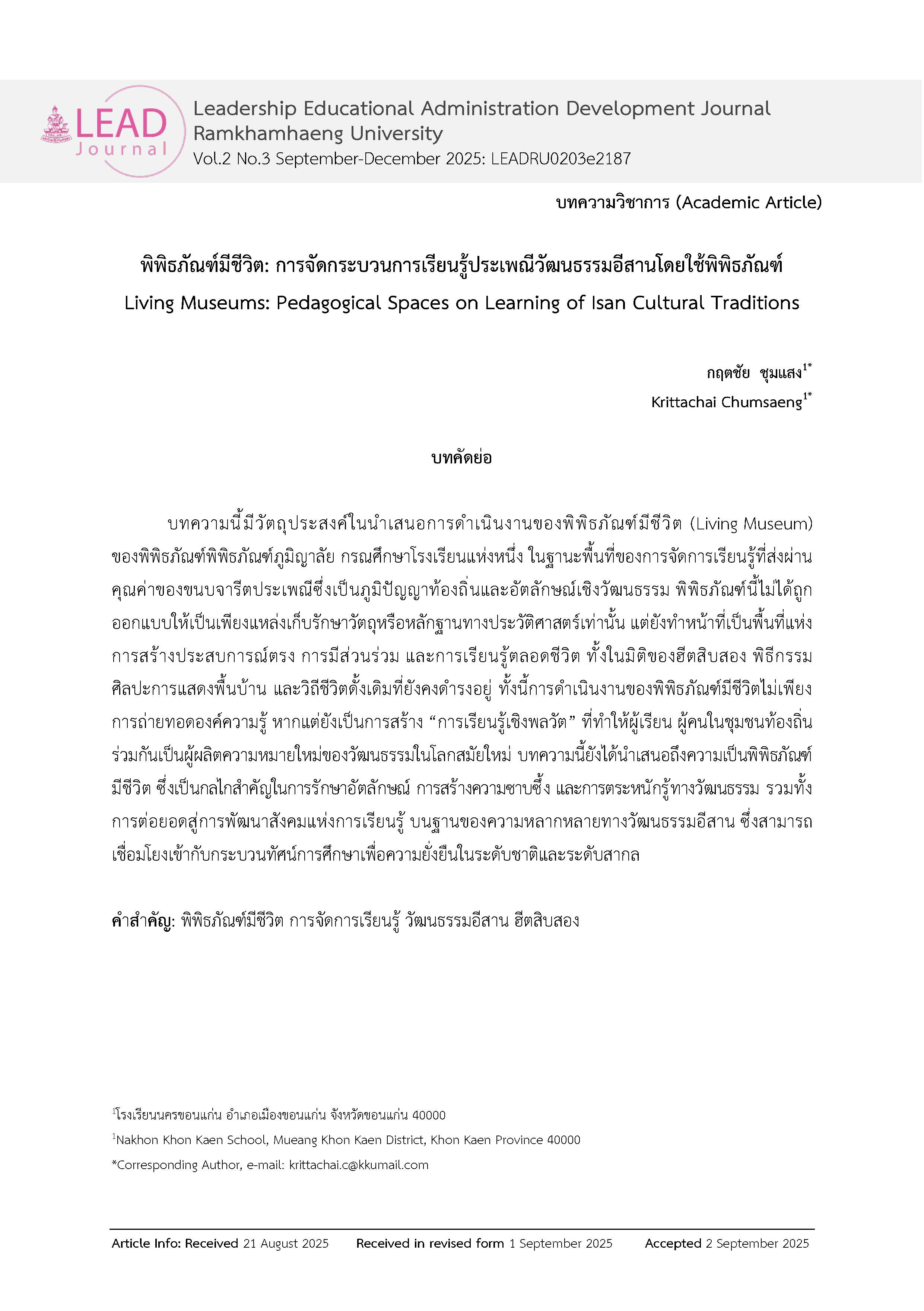Living Museums: Pedagogical Spaces on Learning of Isan Cultural Traditions
Main Article Content
Abstract
This article presents the operational framework of the Living Museum at Phumiyalai Museum, a particular school, as a pedagogical learning space that conveys the values of Isan local traditions. The museum is also designed not merely as a repository for artifacts or historical evidence, but as an interactive space facilitating direct experience, participatory engagement, and lifelong learning. This living museum encompasses the dimensions of The Heet Sib Song (Twelve Local Rituals), ceremonial practices, folk performing arts, and traditional ways of life that have endured for the Isan people. Furthermore, the Living Museum serves as a medium for knowledge transmission and the cultivation of dynamic learning, enabling learners and community members to generate new cultural meanings in a contemporary context collaboratively. The article also highlights the role of the Living Museum as a pivotal mechanism for preserving cultural identity, fostering aesthetic and artistic appreciation, and promoting awareness, while simultaneously advancing a learning-oriented society grounded in the diversity of Isan culture. Such an operational approach aligns with educational paradigms that emphasize sustainability at both national and global levels.
Downloads
Article Details

This work is licensed under a Creative Commons Attribution-NonCommercial-NoDerivatives 4.0 International License.
แนวคิดและข้อเสนอแนะที่นำเสนอในบทความของวารสารการบริหารและความเป็นผู้นำทางการศึกษา มหาวิทยาลัยรามคำแหง เป็นแนวคิดที่มาจากผู้เขียน หากมีความผิดพลาดใด ๆ ผู้เขียนเป็นผู้รับผิดชอบแต่เพียงผู้เดียว
ทั้งนี้ บรรณาธิการ กองบรรณาธิการ และคณะกรรมการหน่วยจัดทำวารสารฯ จะไม่ก้าวก่ายความมั่นคงในหลักการตามความคิดของผู้เขียน
ดังนั้น บรรณาธิการ กองบรรณาธิการ คณะกรรมการหน่วยจัดทำวารสาร และมหาวิทยาลัย จะไม่รับผิดชอบใด ๆ จากผลที่เกิดขึ้นจากการนำเสนอแนวคิด และข้อเสนอแนะของผู้แต่งที่เผยแพร่ในวารสารฯ
References
Appadurai, A. (1996). Modernity at large: Cultural dimensions of globalization. Minneapolis: University of Minnesota Press.
Arnstein, S. R. (1969). A Ladder of Citizen Participation. Journal of the American Institute of Planners, 35(4), 216-224.
Bourdieu, P. (1986). The Forms of Capital. In J. Richardson (Ed.), Handbook of Theory and Research for the Sociology of Education (pp. 241-258). New York: Greenwood Press
Chumsaeng, C. (2023). The Development of the Multiple Intelligences of Students Using Community-based Learning
Management: A Case Study of the Creation of the Youth Drama Hed Dee at Nakhon Khon Kaen School, Khon Kaen Province. Journal of Humanities, Social Sciences, and Education, Mahidol University, 6(2), 263-298. [In Thai].
Falk, J. H., and Dierking, L. D. (2013). The Museum Experience Revisited. New York: Routledge.
Hobsbawm, E. J., and Ranger, T. (Eds.). (1983). The Invention of Tradition. Cambridge: Cambridge University Press.
Jerawang, C. (2020). Local Museum Management with Community Participation and Development: A Case Study of Khun Lahar Local Museum. (Independent Study, Thammasat University). [In Thai].
Jutagate, A. (2014). Community Participation in Learning Management of the Bangkok Local Museums. Veridian E-Journal, 7(3), 1113-1124. [In Thai].
Kaochim, T., Sinthuboon, K., ..., and Rakpan, K. (2024). Living Museum Design Guidance for Cultural Tourism: Inthakhin Community, Mae Taeng, Chiang Mai. Genesha Journal, 20(2), 183-197. [In Thai].
Kolb, D. A. (2015). Experiential Learning: Experience as the Source of Learning and Development. (2nd ed.). New Jersey: Pearson Education, Inc.
Nadprasert, P., Boriboon, G., and Sungsri, S. (2017). Management of Local Museums to Promote Lifelong Learning. Veridian E-Journal, 10(2), 861-878. [In Thai].
Nakhon Khon Kaen School. (2021). Report on the Implementation of the Third Month Merit-making Ceremony, Boon Khao Jee. Khon Kaen: Nakhon Khon Kaen School. [In Thai].
Panyachit, S. (2019). Local Museum: The Role of Arts, Culture and Sustainable Development. Journal of Fine and Applied Arts, Srinakharinwirot University, 23(2), 113-128. [In Thai].
Phunwoon, P. and Soontayatron, S. (2019). Perception of Cultural Identity, Uniqueness, and Symbol Affecting the Mon's Awareness Towards Socio-cultural Impacts of Tourism in
Ko Kret, Thailand. Journal of Sports Science and Health, 20(2), 151-165. [In Thai].
Pinkosol, S. (2017). Museum Management for Learning: A Case Study of Bangkok Folk's Museum. (Master's Thesis, Burapha University). [In Thai].
Pluemsamrungit, P. and Wilaikum, F. (2018). Museum: Learning Resources for Developing Learners in the 21st Century. T.L.A. Bulletin, 62(1), 43-67. [In Thai].
Ruso, L. and Topdal, E. B. (2014). The Use of Museums for Educational Purposes Using the Drama Method. Procedia-Social and Behavioral Sciences, 141(2014), 628–632
Simok, S. (2023). Development of Community Learning Resources based on Local Wisdom on Religion and Traditions by Emphasizing the Cooperation of Communities. Academic Journal for the Humanities and Social Sciences Dhonburi Rajabhat University, 6(3), 1-13. [In Thai].
Tahom, U. and Senarat, S. (2018). Application of Cultural Capital and Local Community Development in the Northeastern Region. Journal of Buddhist Studies Vanam Dongrak, 5(1), 15-24. [In Thai].
Uztemur, S., Dinc, E., and Acun, I. (2019). Teaching Social Studies in Historic Places and Museums: An Activity-based Action Research. International Journal of Research in Education and Science, 5(1), 251-271.
Vallibhotama, S. (2018). Museums and Local History: A Collaborative Learning Process. Bangkok: Lek-Prapai Viriyapant Foundation. [In Thai].
Vygotsky, L. S. (1978). Mind in Society: The Development of Higher Psychological Processes. Cambridge: Harvard University Press.


